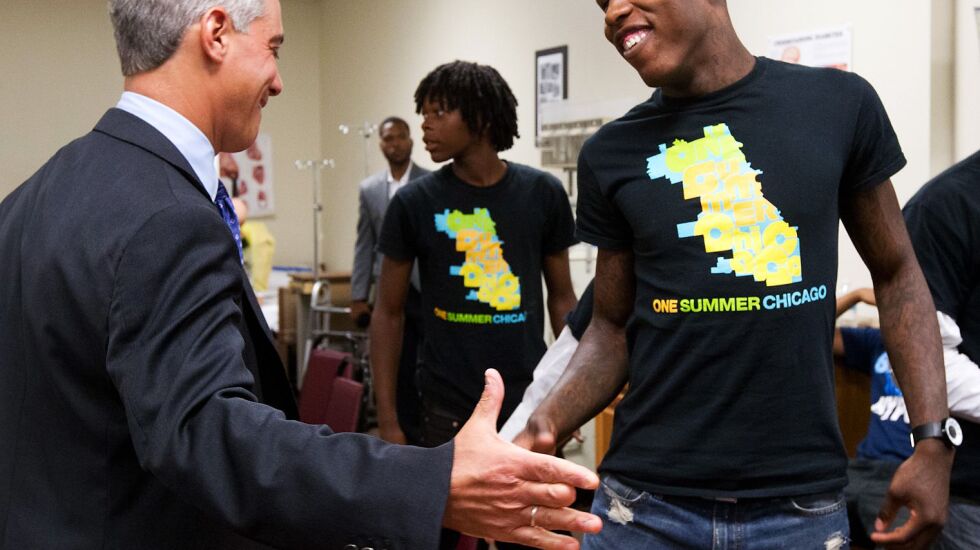Mayor Brandon Johnson campaigned on a promise to deliver Chicago from violent crime by doubling the number of summer jobs for young people and making those employment opportunities year-round.
He’ll have to settle for incremental progress, at least for the time being.
On Monday, Johnson launched his first version of Chicago’s annual summer jobs program, with 24,000 jobs and internships for young people ages 16 to 24.
That’s 2,000 jobs more than the city created last year, but 8,000 fewer jobs and internships than the program known as One Summer Chicago created in 2019 under then-outgoing Mayor Rahm Emanuel.
Even so, Johnson praised the business community for answering the call. He portrayed the program as the “start of a bold transformational approach” and said he is excited about its potential for reducing the violence that routinely spikes along with the temperatures.
“We know that the outcomes will be dramatically different when we invest in young people. We know what the outcomes will be when our children feel loved, supported and seen,” Johnson said.
“As a teacher, I’ve looked into the eyes of children every single day who long for hope. I’ve seen what the lack of opportunity looks like and that’s what drives me today. … By creating pathways to employment for youth, we are showing our young people that we truly do love them and that we trust them. We believe in them. And that they truly have a seat at the table.”

Jennifer Johnson, deputy mayor for education, youth and human services, said the “rapid expansion” of paid summer opportunities for young people will be accomplished, in part, by providing “additional resources” to City Colleges and Chicago Public Schools.
“CPS is working with some of our most vulnerable people who’ve been disconnected. And we’re bringing them back because they are worth it,” she said.
But she made it clear that summer jobs are “not enough.” Chicago needs “additional year-round, paid opportunities and jobs for our young people of all ages” — created with their input.
“They know from their lived experiences their own needs, and we ought to be taking their words and their thoughts and their feelings into account with everything that we do,” Jennifer Johnson said.
Brad Tietz, vice-president of government relations and strategy for the Chicagoland Chamber of Commerce, said ensuring every young person has the opportunity to “have a job and learn about different careers ... ...is not only the right thing to do” but also “helps address our immediate and long-term public safety challenges. It provides Chicago businesses today a new talent pool at a time of persistent labor challenges and shortages that are impacting every industry. And it builds Chicago’s workforce of tomorrow.”
Interim Police Superintendent Fred Waller said 76 young people will serve the Chicago Police Department this summer alongside community policing officers.
Those young people “will learn a lot from our experienced CPD members who dedicate themselves to building trust and enhancing safety in all of our neighborhoods,” Waller said.
“But we also have a lot to learn from young people who will be working with us this summer. They know firsthand what it’s like to grow up as a teenager or young adult in Chicago. They can help us learn what we, as a Chicago Police Department, can do better so that our youth feel safe and supported.”
Julian Green, senior vice-president of communications for the Chicago Cubs, said he knows first-hand how important the summer jobs program is. He’s a product of it. He got his start as a recreation leader at Tuley Park.
“I was you — and I want you to be me someday,” Green told the young people gathered at the nonprofit group A Knock at Midnight, 400 W. 76th St., where Johnson launched the summer jobs program.
A Knock at Midnight serves Englewood, West Englewood, Chatham and Auburn Gresham. This summer, it will place 100 young people at more than a dozen local businesses, nonprofits and community organizations.
“When people ask me about what do we do in the immediate [future] to make sure that we are building a better, stronger, safer Chicago,” the mayor said, “A Knock at Midnight is doing just that.”







